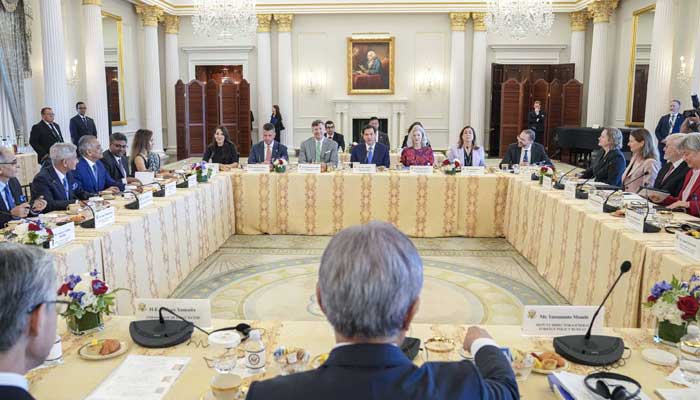WASHINGTON: The Quadrilateral Security Dialogue — commonly known as the Quad — comprising the United States, India, Japan, and Australia, has called for immediate justice following the deadly April 22 attack in Pahalgam, located in Indian Illegally Occupied Jammu and Kashmir (IIOJK), which killed 26 tourists.
In a joint statement issued Tuesday by the US State Department after a high-level meeting in Washington, the Quad foreign ministers condemned the act of terrorism but notably refrained from directly blaming any country.
“The Quad unequivocally condemns all acts of terrorism and violent extremism in all its forms and manifestations, including cross-border terrorism,” the statement read.
The ministers urged all United Nations members to cooperate fully with relevant authorities to ensure justice for the “perpetrators, organisers, and financiers of this reprehensible act,” and emphasized the need for swift accountability.
The omission of any direct reference to Pakistan in the statement drew attention, especially after India immediately blamed Pakistan for the incident — without offering any public evidence to support its claim. Pakistan, in response, strongly denied the allegations and instead called for a transparent, independent investigation led by neutral international observers.
Armed Clashes Follow Deadly Attack in IIOJK
The Pahalgam attack escalated long-simmering tensions between nuclear rivals India and Pakistan. In its aftermath, both countries exchanged heavy fire, marking the most intense military confrontation since the Balakot air strikes of 2019.
India’s accusations prompted a strong reaction from Pakistan. In what Islamabad termed “defensive retaliation,” Pakistan launched Operation Bunyan-um-Marsoos, targeting multiple Indian military installations across various sectors.
According to Pakistan’s Inter-Services Public Relations (ISPR), the operation resulted in the downing of six Indian fighter jets, including three state-of-the-art Rafales, and the destruction of numerous surveillance drones.
The cross-border fighting reportedly lasted 87 hours before both sides agreed to a ceasefire on May 10. Civilian casualties on both sides were significant, and dozens of villages near the Line of Control were evacuated.
Read: Trump Claims Israel Agrees to 60-Day Gaza Ceasefire, Urges Hamas to Respond
While India has remained tight-lipped about the exact losses suffered during the confrontation, analysts suggest the engagement marked one of the most serious flare-ups between the two countries in recent years.
US-Brokered Ceasefire and Nobel Prize Nomination for Trump
The conflict ended after Washington stepped in, with former US President Donald Trump claiming on social media that his diplomatic outreach and threats to pause trade talks helped broker the ceasefire.
“Peace must always win over war,” Trump wrote, shortly after confirming that both India and Pakistan had agreed to stop hostilities. However, New Delhi later downplayed Trump’s involvement, asserting that the ceasefire had been negotiated through backchannel diplomacy.
In contrast, Pakistan acknowledged Trump’s role and credited him for helping de-escalate a potential nuclear conflict. The Pakistani foreign ministry even nominated Trump for the 2026 Nobel Peace Prize, citing his “exceptional efforts in averting war and restoring regional peace.”
Despite the uneasy calm that now holds along the border, underlying tensions remain unresolved. Pakistan continues to push for a UN-led probe into the Pahalgam attack, while India maintains its accusations.
As the Quad reiterates its anti-terrorism stance without taking sides, it remains to be seen whether the grouping can play a more active role in future conflict prevention between two of South Asia’s most volatile neighbors.
